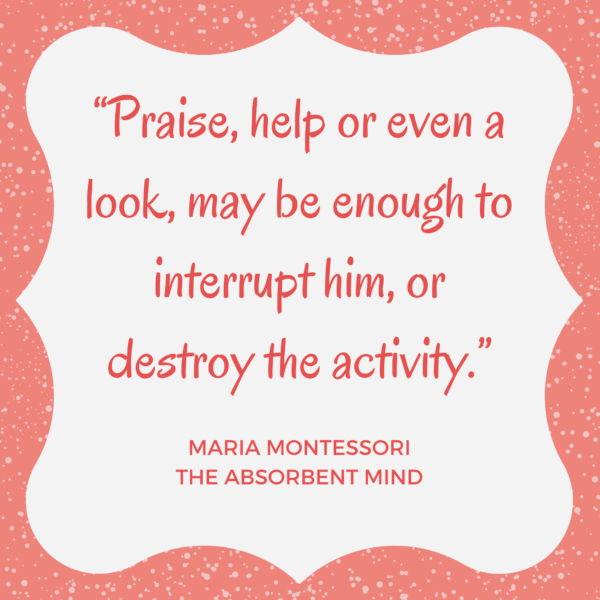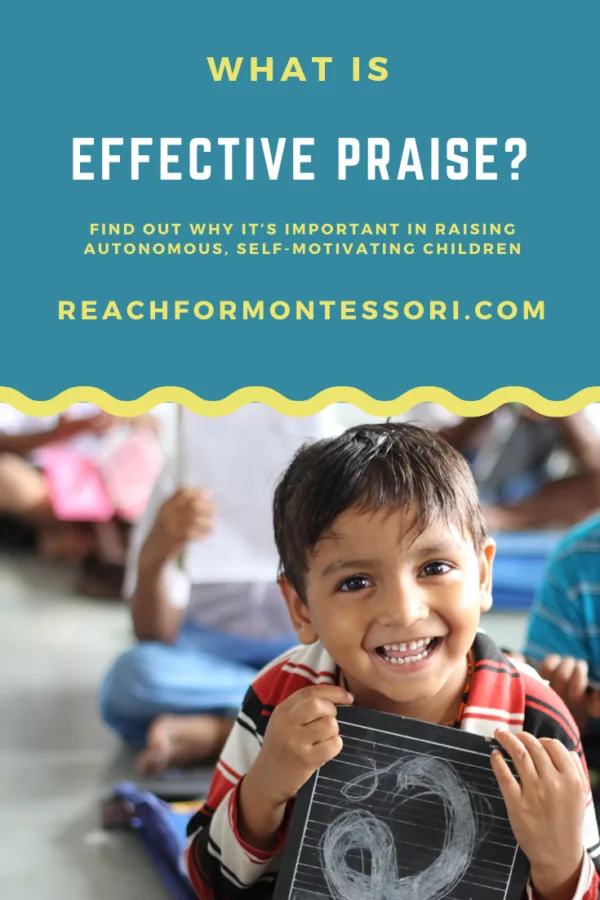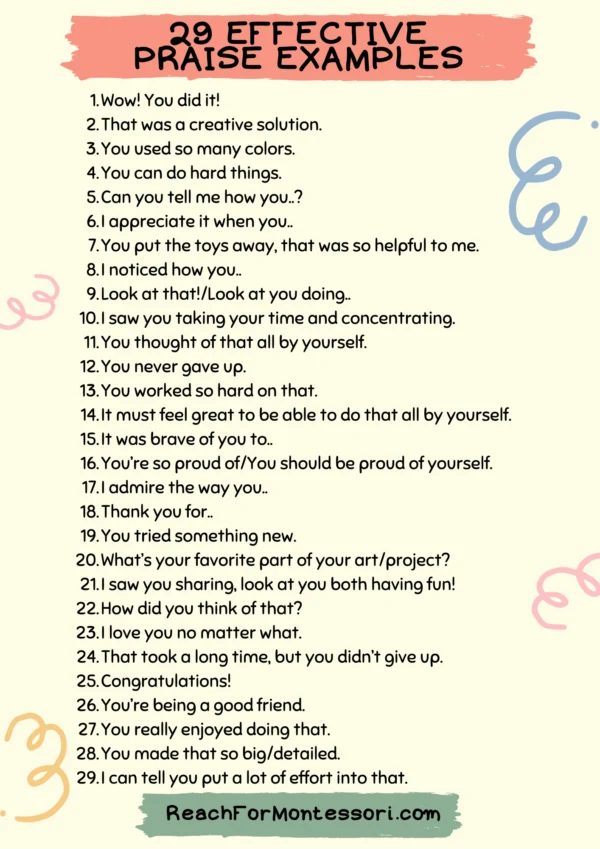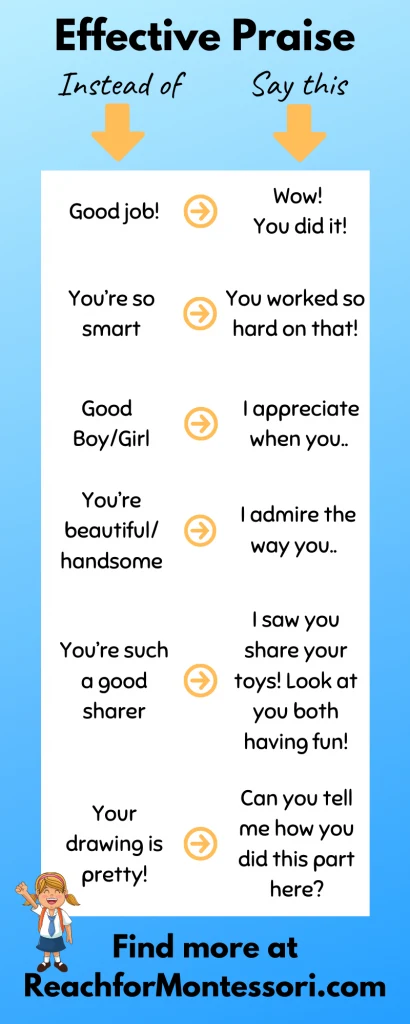Effective Praise is a common term used in the Montessori world and actively used in Montessori classrooms. But what does it really mean, and isn’t any type of praise good??
Sue has a fantastic article discussing how the phrase “Good Job” can be harmful. Please check it out here. ”Good Job” is a perfect example of what is NOT effective praise. I’d like to go further into this topic and discuss what Effective Praise is and why it is important.

What is Effective Praise?
Effective Praise (sometimes also referred to as Encouraging Praise, Descriptive Praise, or Process Praise) is genuine, thoughtful encouragement that is intended to build a child’s intrinsic motivation. It praises the effort or process instead of the result and is not achievement-based.
Intrinsic motivation is the desire to do something for your own internal satisfaction or enjoyment. According to the National Mental Health and Education Center, children learn better and retain information longer if they are intrinsically motivated.
Another important study published in 2013, discovered ”that process praise results in greater persistence and better performance on challenging tasks.” (Gunderson, et al., 2013)
You can also see intrinsic motivation being encouraged through the control of error in Montessori materials and the environment.

How Can Any Praise Be Bad?
In contrast, empty or ineffective praise (sometimes called Person Praise) can be insincere, extreme and may cause a child to become solely extrinsically motivated (doing something for a verbal or tangible reward or to avoid punishment). “Good job,” or “You are so smart” are examples of ineffective or person praise.
It can sometimes be manipulating and undermining: “You are a good girl for listening.” In this case, you are praising a child for behaving the way you’d like.
Over the years, there have been multiple studies showing the harm ineffective praise can cause:
- A study connecting low self-esteem to person praise vs. effort praise (Brummelman, et al., 2013)
- A 2015 research article regarding a link between overpraise and narcissistic personality traits (Brummelman, et al., 2015)
- A study finding that “praising children for being smart promotes cheating.” (Zhao et al., 2017)
- Researchers Mueller and Dweck discovered children were more likely to avoid challenges when praised for their intelligence (Dweck & Mueller, 1998)

The Harm in “You’re So Smart/Special/Beautiful”
Understandably, we want to tell our children how wonderful they are and build up their self-esteem. However, as the studies I listed above demonstrate, constantly telling them they are smart/special/beautiful, etc. can do the opposite of what we want it to.
It may end up making them believe that these characteristics are unchangeable, causing them to not want to attempt difficult things or even learn something new.
Constant superficial or “person praise“ can also put burden on them and make them feel like they have too high standards to live up to.
If they fail a test; they are no longer smart. If they gain weight; they are no longer beautiful.
What if they have a teacher, boss or even a significant other that doesn’t praise them? It can be detrimental to their self-worth if they’re used to constant person praise.
Sometimes it’s hard not to praise your child, as parents we think everything our child does is the most amazing thing. I get it! But there are definitely ways to encourage your child and build their self-esteem just by changing the wording that we’re used to using!
How To Use Praise/Encouragement Effectively
The key is Effective Praise is more factual and observational than opinion-based. Try to avoid your own evaluations or using opinion-based phrases such as “I like.”
It also tends to be more descriptive, which has the upside of building their vocabulary, speech and communication skills!
For example, a child shows you something they painted. If you said “Good job! It’s so pretty!” That would be ineffective, evaluative praise. This is encouraging them to create something for approval, and ends the dialogue.
On the other hand, you could say: “Wow! You worked hard on that and used a lot of red and blue! Can you tell me how you did this part here?”
This is praising their effort and process and encouraging them to appreciate their own hard work. It also encourages a dialogue between you two.
Of course saying all that wouldn’t necessarily work for a baby or younger toddler. Wording should be adapted depending on the age and level of your child.
Some short simple phrases for babies and younger toddlers:
- “You did it!”
- ”Wow!” Or “Yay!”
- ”Look at you doing X”

Effective Praise Can Create Happy Adults
I believe it is important to note that our children need our support and encouragement at all times, not just when they’re doing something we see as “good” or achieved something.
Think about it this way, their self-worth shouldn’t depend on whether you liked their drawing or whether they performed perfectly on a test.
When they’re struggling we still need to encourage them effectively.
Try saying things like:
- “What else can you try?”
- “You can do hard things.”
- ”I see you struggling, let’s work together to figure this out.”
Now, do I think a few “good jobs” or telling them they’re awesome once in awhile are going to “ruin” your child? Of course not!
Do I slip up and use the “wrong” phrasing? Absolutely! All the time! But by changing our mindset and balancing it out with effective praise, we can raise our children to be self-motivating, confident, emphatic, well-rounded adults.
That being said, I also believe that there are some exceptions. There are some children who just naturally require Words of Affirmation to feel loved.
However, every child should be praised effectively and if we are mindful of how we phrase things, it can make a huge difference in their happiness.
And you can never go wrong with a simple “I love you.”


Livia Adams
Saturday 2nd of September 2023
Effective praise that incites that intrinsic motivation is always a helpful reminder for all of us adults when speaking with children. I would like to post on Facebook page your examples of effective praises. Great reminders! Thank you
Merk
Wednesday 7th of October 2020
Great Post. I really began exploring the impact of our words to our kids (and ourselves) a couple years ago. It has made such a difference in my kids confidence level and how they speak to others.